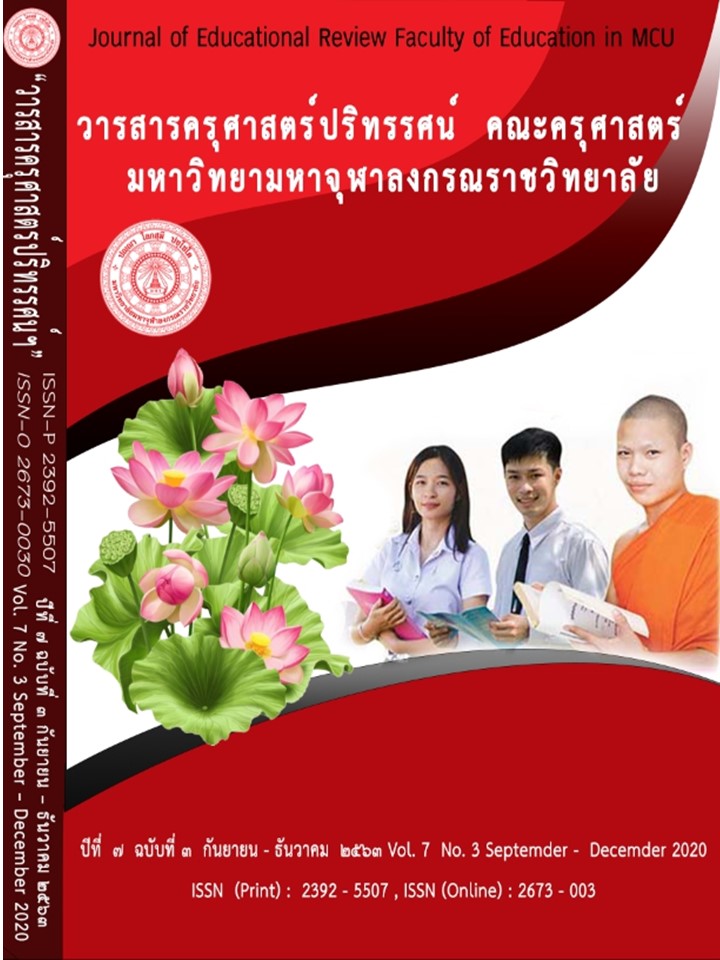EXPERIENTIAL LEARNING MANAGEMENT USING EDUCATIONAL GAME FOR BASIC MATHEMATICAL SKILL DEVELOPMENT OF PRE-SCHOOL PUPILS OF ANONGNART KINDERGARTEN SCHOOL
Main Article Content
Abstract
The purposes of this research were 1) to develop basic mathematics skills of pre-school pupils of Anongnart Kindergarten before and after being engaged in experiential learning management using Snakes and Ladders’Game and 2) to compare the pupils’ knowledge of overall, the basic mathematics skills and basic mathematics of numbers 1-20, memorization of numbers 1-20, arrangement of numbers 1-20 and addition of numbers 1-20 after participating in experiential learning management using Snakes Game. By using the simple random sampling technique, the study sample were comprised of 16 pre-school pupils who were learning in Anongnart Kindergarten in the second semester of academic year 2019. The research instruments included experiential learning management plans containing learning activities based on Snakes Game and a test to evaluate the pupils’ mathematics knowledge. The statistics used for analyzing the collected data were percentage, mean, standard deviation and t-test. The research findings were as follows: 1) overall, the basic mathematics skills in knowledge after participating in experiential learning management using Snakes Game was at high. 2) the basic mathematics skills of total scores, the score of numbers 1-20, memorization of numbers 1-20 , arrangement of numbers 1-20 and addition of numbers 1-20 after participating in experiential learning management using Snakes Game was at high and 3) after being engaged in learning experience using Snakes Game, the pupils of Anongnart Kindergarten gained a higher level mean score of basic mathematics skills than they did before experimental teaching at the 0.05 level of significance.
Article Details
ทัศนะและความคิดเห็นที่ปรากฏในบทความในวารสารฉบับนี้ถือเป็นความรับผิดชอบของผู้เขียนบทความนั้นเพียงผู้เดียว และไม่ถือเป็นทัศนะและความรับผิดชอบของกองบรรณาธิการ
กองบรรณาธิการขอสงวนสิทธิ์ในการคัดเลือกบทความลงตีพิมพ์และจะแจ้งให้เจ้าของบทความทราบหลังจากผู้ประเมินบทความตรวจอ่านบทความแล้ว
ต้นฉบับที่ได้รับการตีพิมพ์ในวารสารครุศาสตร์ปริทรรศน์ คณะครุศาสตร์ มหาวิทยาลัยมหาจุฬาลงกรณราชวิทยาลัย ถือเป็นกรรมสิทธิ์ของคณะครุศาสตร์ มหาวิทยาลัยมหาจุฬาลงกรณราชวิทยาลัย ห้ามนำข้อความทั้งหมดหรือบางส่วนไปพิมพ์ซ้ำ เว้นเสียแต่ว่าจะได้รับอนุญาตจากมหาวิทยาลัยฯ เป็นลายลักษณ์อักษร
References
กระทรวงศึกษาธิการ. (2560). หลักสูตรการศึกษาปฐมวัย พุทธศักราช 2560. กรุงเทพมหานคร: โรงพิมพ์ชุมนุมสหกรณ์การเกษตรแห่งประเทศไทย.
ทอรุ้ง สำเร็จเฟื่องฟู. (2558). ผลการจัดประสบการณ์การเรียนรู้โดยใช้เกมการศึกษาเพื่อพัฒนาทักษะทางคณิตศาสตร์ของเด็กปฐมวัย. วิทยานิพนธ์ครุศาสตรมหาบัณฑิต. มหาวิทยาลัยราชภัฎราชนครินทร์.
ทิศนา แขมมณี. (2554). ศาสตร์การสอน องค์ความรู้เพื่อจัดกระบวนการเรียนรู้ทีมีประสิทธิภาพ. กรุงเทพมหานคร: ด่านสุทธาการพิมพ์
นุจิรา เหล็กกล้า. (2561). การพัฒนาทักษะพื้นฐานทางคณิตศาสตร์โดยใช้เกมการศึกษาของเด็ก ปฐมวัยชั้นปีที่ 2 โรงเรียนบ้านบางแก้ว. วิทยานิพนธ์ครุศาสตรมหาบัณฑิต. มหาวิทยาลัยราชภัฎราชนครินทร์.
ประจักษ์ เอนกฤทธิ์มงคล. (2559). การพัฒนาความสามารถการคิดวิเคราะห์พื้นฐานทางคณิตศาสตร์ของเด็กปฐมวัยโดยใช้ชุดกิจกรรม. วิทยานิพนธ์ศึกษาศาสตรมหาบัณฑิต. มหาวิทยาลัยธุรกิจบัณฑิตย์.
สิริมณี บรรจง. (2549). เด็กปฐมวัยกับทักษะพื้นฐานทางคณิตศาสตร์. กรุงเทพมหานคร: คณะครุศาสตร์ มหาวิทยาลัยราชภัฏสวนสุนันทา.
โรงเรียนอนุบาลอนงค์นาฏ. (2557). รายงานการประเมินตนเอง Self Assessment Report : SAR 2555-2557. กรุงเทพมหานคร: โรงเรียนอนุบาลอนงค์นาฏ.
สำนักงานคณะกรรมการการพัฒนาเศรษฐกิจและสังคมแห่งชาติ สำนักนายกรัฐมนตรี. (2562). แผนพัฒนาเศรษฐกิจและสังคมแห่งชาติ ฉบับที่ 12 พ.ศ. 2560–2564. แหล่งที่มา https://www.nesdc.go.th/ewt_dl_link.php?nid=6422 สืบค้นเมื่อ 9 ม.ค. 2563
Kato, Yasuhiko; Honda, Mika; Kamii. (2006). Card Dominoes. YC Young Children; Washington. 61(4). 82-88.


